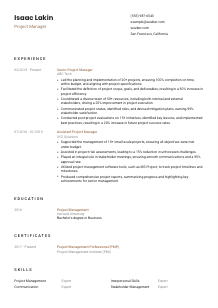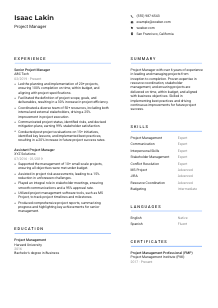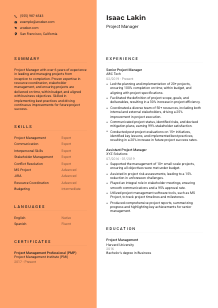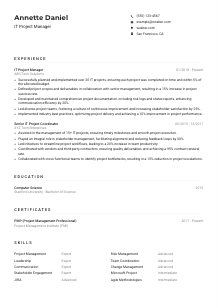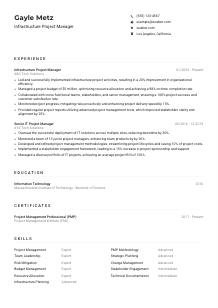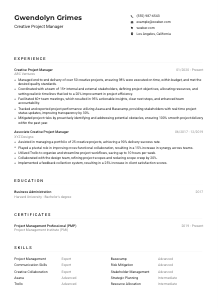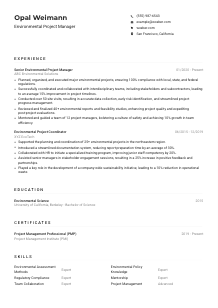Project Manager CV Example
Leading projects, but your CV seems off-track? Navigate this Project Manager CV example, designed with Wozber free CV builder. Discover how you can outline your leadership milestones to sync with job beacons, propelling your career trajectory in the right direction!
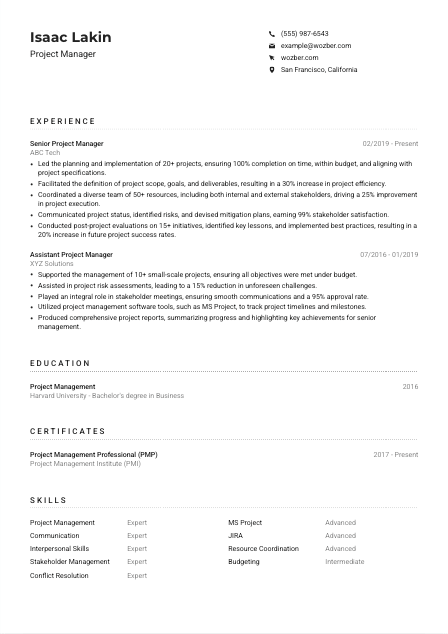
How to write a Project Manager CV?
Embarking on crafting your Project Manager CV is akin to initiating a critical project with a defined goal: landing your dream job. In the realms of project management, where precision, strategy, and adaptation are key, your CV must reflect these same qualities. Leveraging Wozber's free CV builder, we've engineered a guide replete with nuanced strategies and best practices specifically for Project Managers aiming to shine in the competitive job landscape. Let's pivot your career trajectory upwards with a CV that's not merely a document, but a testament to your project mastery.
Personal Details
Like the first milestone in your project plan, the Personal Details section lays the foundational stone of your CV. Ensure each component aligns with the Project Manager position's prerequisites, embodying professionalism and precision.
1. Name as Your Brand
Consider your name the headline of your professional brand. Emphasize it with a clear, visible font – think of it as the project name that needs to stand out on a dashboard.
2. Align with the Position
Directly below your name, articulate the job title you're aspiring for, "Project Manager". This isn't merely a title; it's a declaration of your professional focus and alignment with the role on offer.
3. Essential Contact Information
Ensure your contact details are current and professional. A misspelled email or an old number can derail your application before it even starts. Double-check this section as if it were a critical risk assessment for a project.
4. Location Accuracy
Given that the position requires being located in San Francisco, California, ensure your address reflects this locality. It's like tailoring a project's resources to the environmental constraints – it shows you're already in the right place at the right time.
5. Professional Profiles
If you have a LinkedIn profile or a professional website, include it. Consider these as part of your portfolio, offering a deeper insight into your professional journey, much like an appendix in a project report.
Takeaway
Craft your Personal Details with the meticulousness of a Project Manager eyeing the finer details. Remember, this section is your virtual handshake – make it count by ensuring it's professional, precise, and project-ready.





Experience
The Experience section is your project portfolio – a showcase of successful projects you've led and contributed to. Here, you're not just listing past roles; you're narrating your journey through the landscapes of project management.
- Led the planning and implementation of 20+ projects, ensuring 100% completion on time, within budget, and aligning with project specifications.
- Facilitated the definition of project scope, goals, and deliverables, resulting in a 30% increase in project efficiency.
- Coordinated a diverse team of 50+ resources, including both internal and external stakeholders, driving a 25% improvement in project execution.
- Communicated project status, identified risks, and devised mitigation plans, earning 99% stakeholder satisfaction.
- Conducted post‑project evaluations on 15+ initiatives, identified key lessons, and implemented best practices, resulting in a 20% increase in future project success rates.
- Supported the management of 10+ small‑scale projects, ensuring all objectives were met under budget.
- Assisted in project risk assessments, leading to a 15% reduction in unforeseen challenges.
- Played an integral role in stakeholder meetings, ensuring smooth communications and a 95% approval rate.
- Utilized project management software tools, such as MS Project, to track project timelines and milestones.
- Produced comprehensive project reports, summarizing progress and highlighting key achievements for senior management.
1. Break Down the Requirements
Analyze the job description as you would a project brief. Identify the required experience in project management, especially in technology or software development, and tailor your accomplishments to mirror these highlights.
2. Roles and Organisations
Present your roles in reverse chronological order. Each role you list is like a phase in a project lifecycle, from your current position back through your significant past posts. This shows the progression and growth of your professional skills.
3. Tailored Achievements
Instead of generic job duties, focus on specific accomplishments, such as "Led the planning and implementation of 20+ projects..." Each bullet point should reflect your direct contribution and outcome, mirroring the job description's focus areas.
4. Quantify Your Impact
Use metrics to quantify your achievements wherever possible. For example, "ensuring 100% completion on time, within budget..." This translates your contributions into tangible outcomes, showcasing your ability to deliver results.
5. Relevance Is Key
Keep your focus laser-sharp. Exclude unrelated achievements that don't contribute to your narrative as a Project Manager. Every detail you include should be a brick in the path leading you to this specific role.
Takeaway
The Experience section is the crux of your professional narrative. By aligning your accomplishments with the job requirements, you're not just applying for a role; you're demonstrating your readiness and aptitude for the challenge ahead. View it as a portfolio of your project management success stories.
Education
Your educational background is the scaffolding of your knowledge. In the realm of Project Management, where methodologies and practices are pivotal, highlighting your relevant education is crucial in establishing your competency.
1. Essential Degree
Given the job's requirement for a "Bachelor's degree in Business, Project Management, or a related field," ensure this is prominently featured. Think of this as meeting the project's baseline requirement.
2. Clear Structure
Organize your education section for quick readability. List your degree, your field, the institution, and your graduation year succinctly. It's like the executive summary of a project review – it needs to convey the salient points swiftly.
3. Tailor Degree Details
Align your degree specifics with the job description. If you majored in Business with a focus on Project Management, highlight this. It's about showing fit – like choosing the right methodology for a project.
4. Relevant Courses
While not mandatory for every CV, listing relevant courses can be advantageous, especially if they align closely with the job's requisites. It's akin to showcasing specialized training for a project task.
5. Additional Achievements
List any honors, clubs, or relevant extracurriculars if they add value to your application. For more advanced roles, emphasize additional degrees, certifications, or continuous education that relates to project management.
Takeaway
Your education is more than a checklist item; it's a testament to your foundational knowledge in Project Management. Craft this section as you would build a solid foundation for a complex project, ensuring it supports and enhances your overall application.
Certificates
In the ever-evolving field of Project Management, staying updated with certifications can greatly enhance your credibility. It signifies your dedication to professional development and mastery in specific areas.
1. Relevant Certifications
Highlight certifications that resonate with the job description. The "Project Management Professional (PMP) certification" is a powerful testament to your expertise and should be prominently displayed if you possess it.
2. Quality over Quantity
Prioritize the listing of certifications. It's akin to project resource allocation – invest your CV real estate in what truly matters and adds value to your application for this specific Project Manager role.
3. Date Details
Include acquisition or expiration dates for time-sensitive certifications. This transparency is like updating project stakeholders – it shows your certifications are current and relevant.
4. Continuous Learning
Demonstrate an ongoing commitment to learning by keeping your certifications updated. This pursuit of knowledge is crucial in the dynamic field of Project Management, showcasing your readiness to adapt and grow.
Takeaway
Your certifications act as endorsements of your skills and knowledge in Project Management. Present them as you would project milestones, evidences of your journey and commitment to excellence in your field.
Skills
The Skills section is a concise inventory of your professional toolkit. For a Project Manager, it's crucial to balance technical aptitude with exemplary leadership and communication skills.
1. Decode the Job Description
Extract both explicit and implied skills required for the role from the job description. Proficiency in "project management software tools such as MS Project, JIRA" is explicitly mentioned and should be highlighted.
2. Align Skills with Requirements
List both hard and soft skills that directly respond to the job posting. For instance, showcase your "Excellent leadership, communication, and interpersonal skills" alongside your technical proficiencies.
3. Organize and Prioritize
Structure your skills section for impact and readability. Prioritize skills that are most relevant to the Project Manager role, akin to prioritizing project tasks based on their significance and impact on the overall project success.
Takeaway
Your skills section is a powerful snapshot of your professional arsenal. Curate it with the precision of a Project Manager aiming for efficiency and effectiveness, ensuring it speaks directly to the needs and challenges of the role you're targeting.
Languages
In our interconnected world, the ability to communicate across cultures is invaluable. For Project Managers, this can be a significant asset, particularly in roles that involve international stakeholders.
1. Review the Requirements
Identify any specific language requirements or preferences in the job description. In this case, the ability to "communicate in English effectively" is a must and should be featured prominently.
2. Highlight Key Languages
List your language proficiency starting with those most relevant to the job. For instance, if you're fluent in English and Spanish, your fluency in English takes precedence in this context.
3. Additional Languages
Don't hesitate to mention other languages you're proficient in. This can showcase your versatility and ability to engage with diverse teams or clients, enhancing your appeal as a global Project Manager.
4. Honesty in Proficiency
Be clear about your level of proficiency in each language, using terms like "Native", "Fluent", "Intermediate", and "Basic". It's crucial that your stated abilities match your actual communication skills.
5. Role Relevance
Consider how your linguistic abilities align with the role's requirements and opportunities. Just as you would assess project resources for their fit and value-add, evaluate how your languages serve the project's – in this case, the job's – goals.
Takeaway
Your linguistic skills are a testament to your ability to navigate the global project management landscape. Like a well-conceived communication plan, they enhance your ability to connect, collaborate, and lead successfully across cultures.
Summary
The Summary section is your elevator pitch – a brief, impactful introduction showcasing your professional essence. For a Project Manager, it's a chance to articulate your proven track record and future potential in a few compelling lines.
1. Grasp the Job's Core
Start by deeply understanding the project at hand – in this case, the job description. Pinpoint what's most essential, such as leadership in technology or software development projects.
2. Kickoff Introduction
Draft an opening statement that positions you within the professional landscape of Project Management, akin to defining the scope in your project initiation document.
3. Address Key Elements
Weave in a showcase of your skills and transformative contributions, akin to presenting a project's success highlights in a stakeholder update. Emphasize how these elements align with the role's specific requirements.
4. Conciseness is Key
Your summary should be potent and succinct, just like a well-crafted project executive summary. It's a teaser that invites further exploration, setting the tone for the detailed narrative that follows in your CV.
Takeaway
Remember, your Summary is the gateway to your professional narrative. Tailor it meticulously to the role, ensuring it mirrors the Project Manager's role's intricacies and challenges. Let it be a testament to your readiness to take on the project that is your next big role.
Launching Your Project Management Odyssey
Equipped with these tailored strategies, you're not just preparing a CV; you're crafting a comprehensive project plan for your career advancement. Just as with any project you undertake, employ the principles of strategic planning, meticulous execution, and continuous improvement. Use Wozber's ATS-compliant CV formats and free ATS CV scanner to ensure your CV isn't just seen but truly stands out.
The journey ahead is promising, filled with opportunities to leverage your unique skills and experiences. Forge ahead with confidence, knowing that your CV is a well-conceived roadmap, guiding you to your next destination in the project management field.

- Bachelor's degree in Business, Project Management, or a related field.
- Minimum of 5 years of experience in project management, preferably in technology or software development.
- Proficiency in project management software tools such as MS Project, JIRA, or similar.
- Excellent leadership, communication, and interpersonal skills.
- Project Management Professional (PMP) certification is a plus.
- Must have the ability to communicate in English effectively.
- Must be located in San Francisco, California.
- Lead the planning and implementation of projects from start to finish, ensuring they are completed on time, within budget, and according to project specifications.
- Facilitate the definition of project scope, goals, and deliverables, ensuring alignment with business objectives.
- Coordinate resources, both internal and external, for effective project execution.
- Regularly communicate project status, risks, and mitigation plans to stakeholders and senior management.
- Conduct post-project evaluations to identify lessons learned and implement best practices for future projects.





